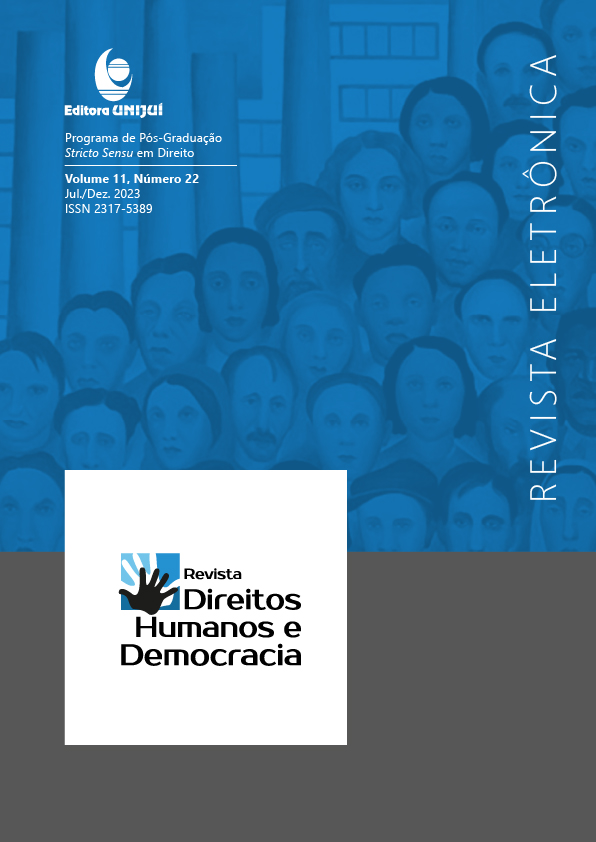O controle de convencionalidade como instrumento de diálogo interjurisdicional das cortes nacionais com a corte interamericana de direitos humanos
DOI:
https://doi.org/10.21527/2317-5389.2023.22.11567Palavras-chave:
Controle de Convencionalidade, diálogo interjurisdicional, Raposa Serra do Sol, Moradia CaiçaraResumo
Este artigo pretende analisar o tema Controle de Convencionalidade como o instrumento de diálogo entre as Cortes nacionais e o Sistema Interamericano de Direitos Humanos. Para alcançar este propósito possui como objetivo demonstrar quais os principais obstáculos para a realização do Controle de Convencionalidade nas decisões dos tribunais nacionais. Como metodologia, procedeu uma pesquisa bibliográfica de caráter dedutivo, na qual vai analisar os pressupostos teóricos de Max Abbot, identificando seus argumentos nas duas decisões emblemáticas usadas como parâmetros do presente artigo: a decisão do Caso Raposa Serra do Sol e a decisão do Caso da Moradia Tradicional de Caiçara. Como resultados e conclusões, esta pesquisa vai apresentar os dois caminhos seguidos pelo Poder Judiciário no Brasil que representam um pequeno indicativo de como as Cortes brasileiras vêm exercendo esse diálogo com o Sistema Interamericano.
Referências
ABBOT, Max Silva. Control de convencionalidad interno y jueces locales: un planteamiento defectuoso. Estudios Constitucionales, Chile, v. 14, n. 2, 2016.
BARROS, Vinicius Alexandre Fortes. Responsabilidade internacional no Sistema Interamericano de Direitos Humanos decorrente do Monólogo Nacional e do não uso do controle de convencionalidade. In: MAZZUOLI, Valério de Oliveira. Novos paradigmas da Proteção Internacional dos Direitos Humanos. Belo Horizonte: Arraes Editores, 2018.
BASSETTO, Marcelo Eduardo Rossitto; KONNO, Alyne Yumi. O caso do povo indígena xucuru perante a comissão interamericana de direitos humanos. Revista da Defensoria Pública da União, [s. l.], ed. 12, p. 27-50, 8 nov. 2019. Disponível em: https://revistadadpu. dpu.def.br/article/view/231.
BRASIL. Constituição (1988). Constituição da República Federativa do Brasil. Brasília, DF: Senado Federal: Centro Gráfico, 1988.
BRASIL. Emenda Constitucional nº 45, de 30 de dezembro de 2004. Altera dispositivos dos arts. 5º, 36, 52, 92, 93, 95, 98, 99, 102, 103, 104, 105, 107, 109, 111, 112, 114, 115, 125, 126, 127, 128, 129, 134 e 168 da Constituição Federal, e acrescenta os arts. 103-A, 103B, 111-A e 130-A, e dá outras providências. EMENDA CONSTITUCIONAL Nº 45, DE 30 DE DEZEMBRO DE 2004. Brasília: MESAS DA CÂMARA DOS DEPUTADOS E DO SENADO FEDERAL, ano 2004, p. 1-9, 30 dez. 2004.
DEPESP. Defensoria Pública do Estado de São Paulo. Ação civil pública, com pedido liminar de reparação de danos materiais emergentes. Registro, SP. 84 p. Disponível em: https://racismoambiental.net.br/wp-content/uploads/2016/12/ACP-ENSEADA-DA-BALEIA.pdf. Acesso em: 8 dez. 2019.
DPU. Defensoria Pública da União. O Caso Povo Indígena Xucuru perante a Comissão Interamericana de Direitos Humanos. Registro, DF. 43 p. Disponível em: https://acervo.socioambiental.org/sites/default/files/documents/xud00023.pdf. Acesso em: 23 jul. 2023.
LEAL Carla Reita Faria; MARTINAZZO, Waleska Piovan. O status constitucional dos Tratados de Direitos Humanos no Ordenamento Jurídico e o Controle de Convencionalidade das Leis: uma abordagem sobre o duplo controle vertical material das leis no Brasil. In: MAZZUOLI, Valério de Oliveira. Novos paradigmas da Proteção Internacional dos Direitos Humanos. Belo Horizonte: Arraes Editores, 2018.
MAZZUOLI, Valério de Oliveira. O controle jurisdicional da convencionalidade das leis. São Paula: Revista dos Tribunais, 2009.
NOTÍCIAS STF. Brasília, 30/09/2014. Disponível em: http://www.stf.jus.br/portal/cms/verNoticiaDetalhe.asp?idConteudo=276407. Acesso em: 9 dez. 2016.
PESSOA, Conrado Falcon. Proteção dos Direitos dos Povos Indígenas a partir da garantia do direito à propriedade privada na jurisprudência do sistema interamericano. In: MAZZUOLI, Valério de Oliveira. Novos paradigmas da Proteção Internacional dos Direitos Humanos. Belo Horizonte: Arraes Editores, 2018.
PET 3388 – Raposa Serra do Sol. Conectas. Brasília, 15/8/2014. Disponível em: http://www.conectas.org/pt/acoes/stf-em-foco/noticia/24172-pet-3388-raposa-serra-doso. Acesso em: 9 dez. 2016.
PIOVESAN, Flavia. Diversidade étnico-racial, constitucionalismo transformador e impacto do sistema interamericano de proteção dos direitos humanos. In: SOARES, Inês Virgínia Prado; PIOVESAN, Flávia. Impacto das decisões da Corte Interamericana dos Direitos Humanos na jurisprudência do STF. Salvador: Juspodvum, 2016.
RODRIGUEZ, José Rodrigo. Como decidem as Cortes? Para uma crítica do direito (brasileiro). Rio de Janeiro: Editora FGV, 2013. Capítulo 2.
Downloads
Publicado
Como Citar
Edição
Seção
Licença
Copyright (c) 2023 Revista Direitos Humanos e Democracia

Este trabalho está licenciado sob uma licença Creative Commons Attribution 4.0 International License.
Ao publicar na Revista Direitos Humanos e Democracia, os autores concordam com os seguintes termos:
Os trabalhos seguem a licença Creative Commons Atribuição 4.0 Internacional (CC BY 4.0), que permite:
Compartilhar — copiar e redistribuir o material em qualquer meio ou formato;
Adaptar — remixar, transformar e criar a partir do material para qualquer fim, inclusive comercial.
Essas permissões são irrevogáveis, desde que respeitados os seguintes termos:
Atribuição — os autores devem ser devidamente creditados, com link para a licença e indicação de eventuais alterações realizadas.
Sem restrições adicionais — não podem ser aplicadas condições legais ou tecnológicas que restrinjam o uso permitido pela licença.
Avisos:
A licença não se aplica a elementos em domínio público ou cobertos por exceções legais.
A licença não garante todos os direitos necessários para usos específicos (ex.: direitos de imagem, privacidade ou morais).
A revista não se responsabiliza pelas opiniões expressas nos artigos, que são de exclusiva responsabilidade dos autores. O Editor, com o apoio do Comitê Editorial, reserva-se o direito de sugerir ou solicitar modificações quando necessário.
Somente serão aceitos artigos científicos originais, com resultados de pesquisas de interesse que não tenham sido publicados nem submetidos simultaneamente a outro periódico com o mesmo objetivo.
A menção a marcas comerciais ou produtos específicos destina-se apenas à identificação, sem qualquer vínculo promocional por parte dos autores ou da revista.
Contrato de Licença: Os autores mantém os direitos autorais sobre seu artigo, e concedem a Revista Direitos Humanos e Democracia o direito de primeira publicação.













